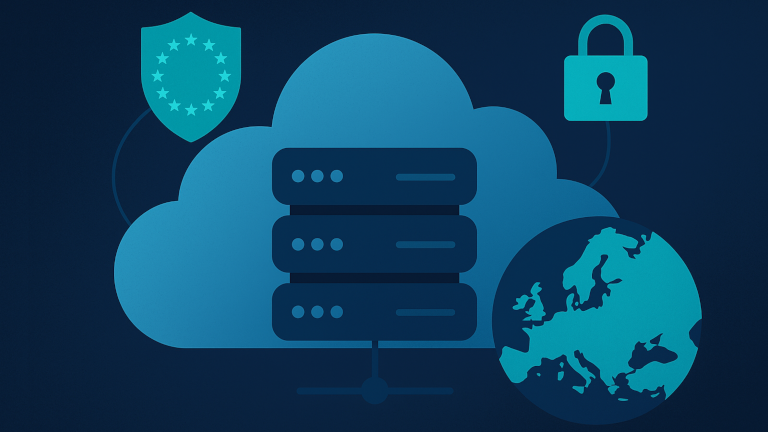The Necessity of a European Cloud
In Europe, there are still hardly any independent cloud offerings – even though digital sovereignty has long been essential for business, government, and society.
For key services such as communication, collaboration, or cloud storage, most organisations rely on the major US providers.
Azure in particular is widespread due to its tight integration with Office 365 and other Microsoft products.
These companies not only dominate the market but also keep users locked in through closed systems and proprietary interfaces.
At the same time, the pressure is increasing: geopolitical tensions, data protection requirements like the GDPR, and dependency on non-European providers pose a significant risk to Europe’s digital infrastructure.
Despite this, there is still no clear European strategy – while other regions, such as China, are deliberately building their own cloud solutions.
A European cloud is therefore not just an option, but a necessity to strengthen independence and safeguard technological innovation in Europe.

The Current State of Affairs
The following services lure in users, lock them in, and keep them there (vendor lock-in):
- Email: Gmail or Outlook – many people use both, one privately, the other for work. Office365 and Outlook are indispensable in today’s work environment – a fact that will be repeated often.
- Office Suite: Here too, Google and Microsoft dominate. Office365 is the de facto standard in the workplace, while Google’s Office Suite also offers excellent features. Notably, Microsoft is increasingly pushing its users into the cloud.
- Cloud Storage: Who doesn’t know the problem – I want to share my documents directly with my colleagues; where do I store my photos? I don’t even want to have to upload them manually – it should happen automatically. Here, Google and Apple dominate the smartphone space, while Microsoft, as usual, serves the enterprise market.
In contrast to Europe, China has never neglected its cloud strategy and has always relied on its own services. Given the tense relationship with the US, these will likely be further expanded.
The Current EU Strategy
Even considering the strained relationship between the US and the rest of the world, too little is happening on the EU’s side. A comprehensive strategy is needed, but so far, it’s not in sight.
There have been repeated attempts to migrate the infrastructure of public services from Microsoft to open source (e.g., Munich’s LiMux or more recently Lyon), but these efforts have been heavily lobbied against (see Statista and Lobbycontrol for Microsoft’s lobbying figures in recent years).
Open source is indeed still behind Microsoft and Google in terms of feature maturity. However, the EU could specifically fund the development of these services so that they reach a level of maturity that is acceptable for their users.
And I think it’s high time something like this happens.
Possible Alternatives
There are already many great tools and providers in the cloud and open-source space, so you don’t have to be tied to Microsoft, Google, or Apple. This list is not exhaustive!
| Cloud Service | Alternatives |
|---|---|
| Teams | Jitsi, Screego |
| Office | CryptPad, LibreOffice, OnlyOffice |
| Outlook | MailCow, Dovecot, RoundCube, OpenSMTP |
| Cloud Storage | OwnCloud, Nextcloud |
| Google Calendar | Radicale, Davx5, Nextcloud |
Many of these services are relatively unknown, and there are few providers who will host them for you. But… they do exist.
And What If Europe Keeps Going Like This?
Europe is already lagging significantly behind in the digital sector, and it will not get better unless investment is made in this area.
Dependence on US services also makes us highly vulnerable.
A strong, self-confident Europe needs its own stable infrastructure – also in the cloud and computing sector.
The EU must act here and create the right incentives and funding to allow a European cloud to grow – perhaps decentralized through small hidden champions, but independent and strong.
How We Can Help You Make the Switch
We can support you in introducing these services and taking over their operation – you can also find more details in our Services section.
Because open-source services and their hosting require specialist knowledge, which we have acquired with painstaking effort.
If you prefer to use a different tool, we will familiarize ourselves with it, gladly provide feedback on your choice, and also take over its operation if needed.
References
- Wikipedia. (2025). LiMux. Retrieved on 01.06.2025 from LiMux
- Der Standard. (2025). Lyon throws out Windows and Office. Retrieved on 30.06.2025 from Der Standard
- Statista (2025). Lobbying expenses of Microsoft Corporation in the European Union (EU) from 2010 to 2022. Retrieved on 14.08.2025 from Statista on Microsoft lobbying expenses
- Lobbycontrol MS (2025). Microsoft Corporation. Retrieved on 14.08.2025 from Lobbycontrol on Microsoft lobbying expenses
